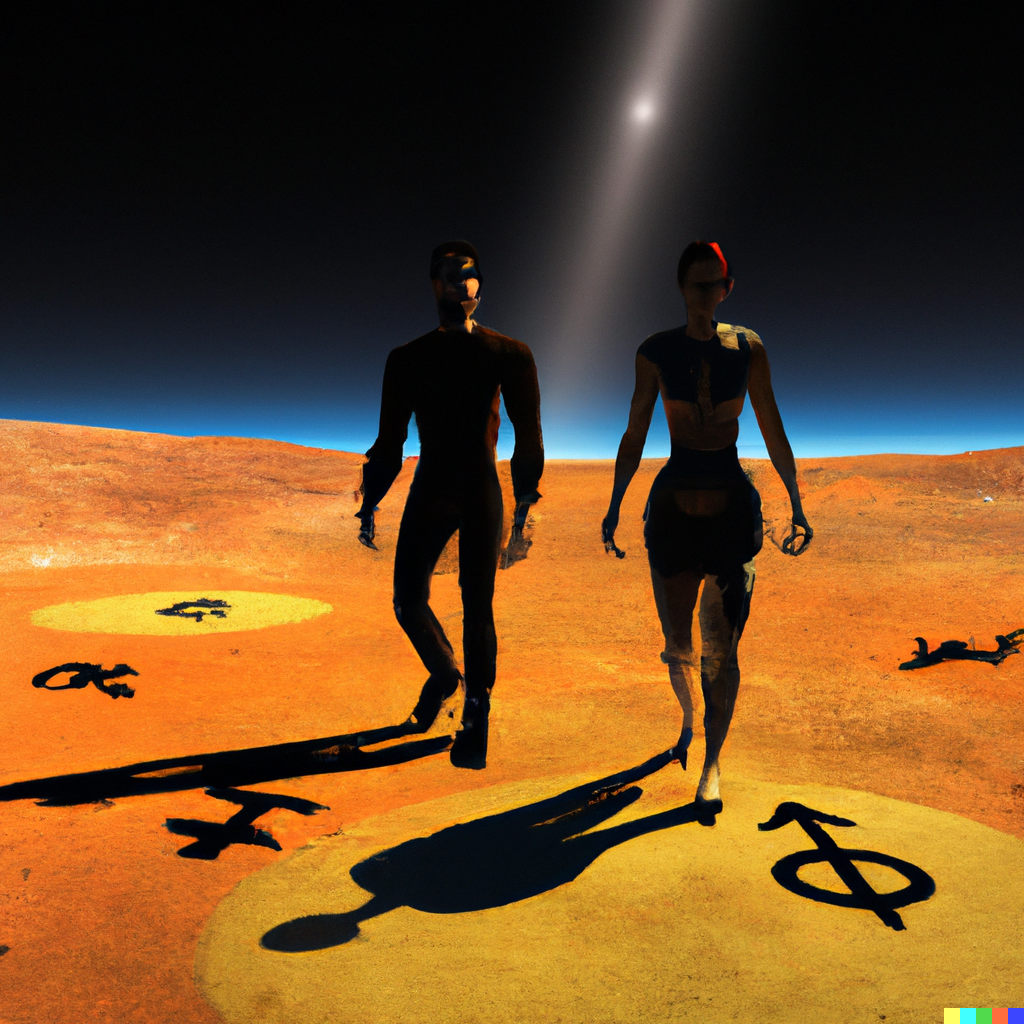Once upon a time in the future, humans had made tremendous progress in technology and space exploration. They had built colonies on the Moon, asteroids, and other planets in the Solar System. However, their ultimate goal was to colonize Mars, the red planet. The journey to Mars was not easy, but they eventually succeeded and established the first human colony on the planet.
The colony on Mars was initially exciting for the human settlers. They had brought everything they needed to sustain themselves, including food, water, and air. The colony was thriving, and the human settlers were making rapid progress in terraforming the planet to make it more habitable.
However, something unexpected happened. The humans discovered that Mars was not uninhabited. The planet was already home to an intelligent species that the humans had never seen before. They were tall, slender, and had a blue tint to their skin. The Martians had never seen humans before and were naturally curious about their new visitors.
The humans were initially surprised by the existence of the Martians. They had not detected any signs of life on Mars during their preliminary scans of the planet. However, the Martians were not hostile, and they welcomed the human settlers to their planet.
The humans quickly learned that the Martians were highly intelligent and had a unique culture. They had their own language, traditions, and way of life. The Martians had been living on Mars for millions of years and had developed their own ecosystem to sustain themselves. They had mastered the art of living in harmony with their planet and had even developed their own technology, which was vastly superior to human technology.
The humans were fascinated by the Martians and were eager to learn more about their culture and way of life. However, not all humans were as respectful towards the Martians as they should have been. Some humans saw the Martians as primitive beings and believed that they could easily dominate them. These humans began to encroach on the Martian territory and started to exploit the planet’s resources without any regard for the Martians.
The Martians tried to reason with the humans and explain to them that their actions were causing irreversible damage to the planet. They pleaded with the humans to stop their destructive behavior, but their pleas fell on deaf ears. The humans were blinded by their greed and desire for power, and they continued to exploit the planet’s resources.
The situation continued to escalate until the Martians decided that they had had enough. They could no longer tolerate the humans’ destructive behavior and decided to rebel against their human overlords. The Martians had a unique advantage over the humans. They had developed their own technology, which was vastly superior to human technology. They had weapons that the humans had never seen before, and they were able to use them to devastating effect.
The humans were caught off guard by the Martian rebellion. They had never expected the Martians to be capable of such a coordinated attack. The humans tried to fight back, but they were quickly overwhelmed by the Martians’ superior weapons and tactics.
The Martian rebellion was swift and decisive. The human colony was destroyed, and the surviving humans were forced to flee back to Earth. The Martians had successfully defended their planet and had shown the humans that they were not to be underestimated.
The humans returned to Earth humbled and defeated. They had learned a valuable lesson about the dangers of underestimating other species and the importance of respecting other cultures. They realized that they had made a grave mistake by ignoring the Martians’ warnings and that their actions had caused irreversible damage to the planet.
The Martian rebellion had a profound impact on human society. It forced humans to reevaluate their relationship with other species and to rethink their approach to space exploration. Humans realized that they could not simply colonize other planets without taking into account the native species that already lived.
Humans realized that they could not simply colonize other planets without taking into account the native species that already lived there. They had to approach space exploration with more caution and respect for other forms of life.
The Martian rebellion also had a significant impact on human technology. Humans began to study the Martian technology, and they learned a great deal from it. They realized that the Martians had developed technology that was far more advanced than anything that humans had ever seen before. Humans began to incorporate some of the Martian technology into their own, leading to a new era of technological innovation and progress.
Years went by, and the humans never forgot the lessons they learned from the Martian rebellion. They continued to explore the Solar System, but this time, they did so with a greater respect for other forms of life. They encountered other intelligent species along the way, but they were careful to avoid conflict and to treat these species with the respect they deserved.
Meanwhile, on Mars, the Martians had returned to their way of life before the human settlers arrived. They continued to live in harmony with their planet, and they remained fiercely protective of it. They had shown the humans that they were not to be underestimated, and they were content to watch from a distance as humans continued to explore the Solar System.
In the end, the Martian rebellion had a profound impact on human society. It forced humans to rethink their approach to space exploration and to develop a greater respect for other forms of life. It led to a new era of technological progress and innovation, and it showed humans that there was much to be learned from other intelligent species in the universe.
That is the end of the story. I hope you found it inspiring and thought-provoking. The story of the Martian rebellion is a reminder that as we explore the universe and push the boundaries of our technological capabilities, we must do so with caution and respect for other forms of life. It is only through cooperation and understanding that we can hope to truly thrive as a species and continue to make progress in our journey towards the stars.

I utilized the power of OpenAI and DALL-E to create this content, with the aim of exploring the capabilities of AI in generating long-form stories and generating human-like images. While the results were only partially successful, I hope that you found the story to be engaging and thought-provoking. As AI continues to advance, we may see even greater potential for it to assist in creative endeavors like writing and art.

